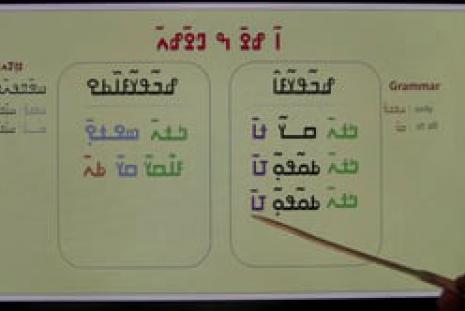Time and timeless greetings in Nko
Nko Greeting ߒߞߏ ߝߏ߬ߟߌ
Lesson Vocabulary
Lesson Vocabulary
| ߊߎ\ߊߟߎ | You (plural) | ||
| ߊ߬ߟߎ | They partitif | ||
| ߎ߬ \ ߊ߬ߟߎ߬ | They (all) | ||
| ߗߍ߭ | Man | ||
| ߞߊ߬ߙߊ߲߬ߡߐ߮ | Teacher | ||
| ߡߎ߬ߛߏ | Woman | ||
| ߊ߬ߟߋ | He/She/It | ||
| ߊ߲ߠߎ߬\\ ߊ߲ߎ߬ | We | ||
| ߋ \ ߌߟߋ | You (singular) | ||
| ߒߠߋ | I | ||
| ߓߏ߲ | Room | ||
| ߖߊ߯ߓߘߊ | University | ||
| ߖߐ߲߫؟ | Who? | ||
| ߘߋ߲ | Child | ||
| ߛߏ | House | ||
| ߞߊ߬ߟߊ߲ | Study | ||
| ߞߊ߬ߟߊ߲߬ߓߏ߲ | Classroom | ||
| ߞߊ߬ߟߊ߲߬ߘߋ߲ | Pupil | ||
| ߞߊ߬ߟߊ߲߬ߛߏ | School | ||
| ߞߊ߬ߟߊ߲߬ߠߊ߬ߘߋ߲ | Student | ||
| ߡߎ߲߬؟ | What? |
Lesson Conversation:
| ߓߎ߬ߓߎ߫ | ߌ ߣߌ߫ ߗߋ߫ ߓߊ߬ߓߊ߫ | Hello Baba | |
| ߓߊ߬ߓߊ߫ | ߒ߬ߓߊ߫߸ ߌ ߣߌ߫ ߞߋ߫ ߓߎ߬ߓߊ߫ | (Interjection), Hello Buba | |
| ߓߎ߬ߓߎ߫ | ߤߙߍ ߓߍ߫؟ | Is there peace? | |
| ߓߊ߬ߓߊ߫ | ߫ߤߙߍ ߘߐߙߐ߲ | Only peace | |
| ߓߎ߬ߓߎ߫ | ߛߏߡߞߐ ߎ߬ ߓߍ߫ ߘߌ߬؟ | How is the family? | |
| ߓߊ߬ߓߊ߫ | ߕߐ߯ߙߐ߫ ߕߴߎ߬ ߟߊ߫߸ ߌ ߝߣߊ߫ ߕߊ߫ ߎ߬ ߘߎ߲߬؟ | They are without evil (They are fine). How about yours? | |
| ߓߎ߬ߓߎ߫ | ߓߊ߯ߛߌ߫ ߛߌ߫ ߕߴߎ߬ ߟߊ߫ | They are without a problem (They are fine) | |
| ߓߊ߬ߓߊ߫ | ߒ ߓߴߊ߬ ߝߍ߬ ߞߊ߬ ߕߊ߯ | I want to go | |
| ߓߎ߬ߓߎ߫ | ߓߊ߯ߛߌ߫ ߕߍ߫߸ ߞߴߊ߲ ߓߴߎ߬ ߝߏ߬ | No problem. Say my hello to the family. | |
| ߓߊ߬ߓߊ߫ | ߎ߬ ߣߴߊ߬ ߡߍ߲߫߸ ߌ ߝߣߊ߫ ߞߴߊ߲ ߓߴߎ߬ ߝߏ߬ | They will hear it (I will). Send mine to yours too | |
| ߓߎ߬ߓߎ߫ | ߎ߬ ߣߴߊ߬ ߡߍ߲߫ | They will hear it ( I will too) |
Lesson Monologue
Greeting song
"ߣߌ߫ ߡߐ߬ߞߐ ߡߌ߲ ߓߴߊ߬ ߝߍ߬ ߞߊ߬ ߛߞߌ߬ ߡߊ߲߬ߘߋ ߝߍ߬߸ ߝߴߌ ߞߊ߬ ߛߐ߲߬ ߞߊ߬ ߞߍ߫ ߝߏ߬ߟߌ ߝߍ߬· ߌ ߓߴߊ߬ ߝߐ߫ "ߌ ߣߌ߫ ߛߞߐ߬ߡߊ߬ ߛߞߐ߬ߡߊ߬ߘߊ ߝߍ߬߸ ߞߵߊ߬ ߝߐ߫ "ߌ ߣߌ߫ ߕߑߟߋ߲߬" ߕߑߟߋ߬ߜߊ߲ ߝߍ߬· ߌ ߓߴߊ߬ ߝߐ߫ "ߌ ߣߌ߫ ߥߎ߬ߟߊ߬" ߥߎ߬ߟߊ߬ߘߊ ߝߍ߬߸ ߞߵߊ߬ ߝߐ߫ "ߌ ߣߌ߫ ߛߎ߫" ߛߎ߫ ߡߎ߬ߡߍ߰ ߝߍ߬· ߣߴߌ ߓߴߊ߬ ߝߍ߬ ߞߊ߬ ߛߞߌ߬ ߡߊ߲߬ߘߋ ߝߍ߬ ߝߴߌ ߞߊ߬ ߛߐ߲߬ ߞߊ߬ ߞߍ߫ ߝߏ߬ߟߌ ߝߍ߬·
If you want to live with Mande people, you must like greetings. In the morning you say: Good morning. In the afternoon you say: Good afternoon. In the evening you say: Good evening. In the night you say: Good night (Good evening).
Lesson Note
Grammar Notes
ߞߟߐ߬ߛߌ߬ߕߊ: ߞߍߓߊ߮ ߕߐ߯ ߣߙߐ߬ߓߌߟߊ ߦߋ߫ ߞߎߡߊߘߋ߲ ߘߐ߫ ߘߋ߬ ߦߋ߫ ߡߌ߲ ߓߍ߫ ߓߌ߬ߟߊ߬ ߕߐ߯ ߝߐߟߋ߲߫ ߞߙߐ߫ ߣߐ߭ ߟߊ߫ ߥߟߊ߫ ߕߐ߯ ߘߐ߲ߠߋ߲ ߘߐ߫ ߣߐ߭ ߟߊ߫ ߡߌ߲ ߓߍ߫ ߞߍߓߊ߯ߦߊ߫ ߘߊߞߎ߲߫ ߘߐ߫ ߟߊ߫ ߞߎߡߦߊ ߞߣߐ߫. ߒߞߏ ߟߊ߫ ߸ ߕߐ߯ ߣߙߐ߬ߓߌߟߊ ߦߋ߫ ߛߎ߯ߦߊ߫ ߘߊߡߊ߲߫ ߘߋ߬ ߦߋ߫ ߏ߬ ߟߎ߬ ߝߌ߬ߟߍ߬ ߣߌ߲߬: ߁߭) ߕߐ߯ ߣߙߐ߬ߓߌ߬ߟߊ߫ ߕߎ߲߰ߕߊ: ߏ߬ ߟߎ߬ ߦߋ߫ ߕߐ߯ ߣߙߐ߬ߓߌ߬ߟߊ߫ ߎ߬ ߘߋ߬ ߦߋ߫ ߡߌ߲ ߎ߬ ߓߍ߫ ߟߊߕߎ߲߰ ߞߎߡߊߘߋ߲߫ ߥߙߍ߫ ߟߊ߫. ߂߲) ߕߐ߯ ߣߙߐ߬ߓߌ߬ߟߊ߫ ߕߎ߲߰ߓߊ߬ߟߌ: ߏ߬ ߟߎ߬ ߦߋ߫ ߕߐ߯ ߣߙߐ߬ߓߌ߬ߟߊ߫ ߎ߬ ߘߋ߬ ߦߋ߫ ߡߌ߲ ߎ߬ ߕߍ߫ ߟߊߕߎ߲߰ ߞߎߡߊߘߋ߲߫ ߥߙߍ߫ ߟߊ߫. Observation: Subject Pronoun is a word which replaces something already mentioned or already known and used as a subject for a sentence. In Nko, there are two kinds of subject pronouns: 1. Conjunct subject pronoun: these are pronouns which are used as a subject and followed by the rest of the sentence Disjoint subject pronoun: These are pronouns which are used as a subject and are not followed by the rest of the sentence.
Cultural Notes
Greeting in Mande is very important. It's cultural significance is so high that one has to deserve greeting to be greeted. In the culture, greeting means extending thanks to someone. If one does not deserve greeting, nobody greets him/her. And if someone deserves greeting and you don't greet him/her; it is considered a lack of respect for the person; this offense is often punished by both the person who was not greeted and the general public.To show a little bit of its significance, consider the following meaning attached to it by the society. When you greet a man, he sends the greeting to his mother by literally saying 'ߒ߬ߓߊ߫' or 'ߊ߲߬ߓߊ߫' "to my mother" or "to our mother", respectively. This is because greeting is an acknowledgement of the good work, the care and the good education the mother gives to her child; and for which the child is now worth receiving the society's acknowledgements. If the greeted person is a woman, she responds by saying 'ߒ߬ߛߋ߫' literally meaning "I am doing what I can". She does not need to send it to any one else.
Student Notes
There are several ways of greeting in Nko, make sure to at least master one and be familiar with the other ones so that when you are greeted, you don't get confused. For every occasion, there is a special greeting. You will learn those as you grow in fluency in the language.

